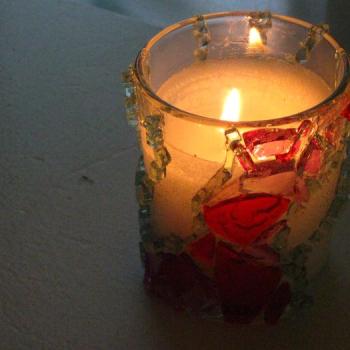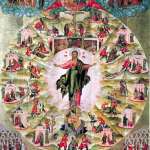In a previous blog post, The Incarnation: Read to Find Out Why It’s Beautiful, I pointed out that the birth of Jesus is beautiful, because Jesus is the Love of God made flesh. Likewise, according to the Catholic tradition, Jesus is the source and summit of beauty (read more in this incredible document entitled Via Pulchritudinis, Latin for Way of Beauty). So we definitely see beauty in Jesus—incarnate Love.
Did Jesus see beauty in His crucifiers?
But does Jesus see beauty in us? And did He see beauty even in those who crucified Him?
When Jesus lay upon the cross, He prayed, “Father, forgive them, they know not what they do.” He seemed to be filled with compassion for those who were torturing and killing him.
I would assert that yes, Jesus saw beauty in us—in sinners; and so much so that this Beauty moved Him to surrender His Life to the Father (not to say that He otherwise would not have, though).
Why would I suggest that Jesus saw Beauty in his persecutors?
Profoundly moved by compassion
Have you ever come across someone who was so in need, so humbled by the burdens of life, that you paused and felt as if everything around you suddenly stopped?
Homeless, and sacred
I can remember walking out of a night club in Philadelphia with my college friends, and seeing a homeless man. He was lying just feet away from where we had danced for hours. He was covered in blankets except for his feet, which were covered in sores. Tears rolled down my face as I was moved with compassion, and at the same time, inspired to do good. I wanted to find a way to give of myself. I wanted to at least try to alleviate some of the suffering I witnessed.
Maybe you have come across someone suffering from homelessness, or drug addiction, or unemployment—and been profoundly moved by compassion. If so, you may have, even without noticing it, encountered beauty in the soul of that beloved human being.
Crucifying, and sacred
Now you might be guessing why I propose that Jesus saw beauty in those who crucified Him. He may have looked upon them, as He looks upon each of us, with the utmost compassion; with wonder and awe at the sacredness of their souls; encountering beauty in each persecutor—unique and created in the image of God.
Psychology of beauty—elevation
In the field of psychology, beauty elicits an emotion called elevation—which is a feeling you get when you are inspired to become a better person; you want to do good. Check out Rhett Diessner’s interview, The Psychology of Beauty and Love, if you want to find out more.
Consecrated to beauty
Interestingly, in the Vatican document, Via Pulchritudinis, the Pontifical Council for Culture writes, “A multitude of men and women have let themselves be seized by this beauty to consecrate themselves to it.” This aligns nicely with the findings on beauty and elevation—many have encountered the beauty of God’s love and were so moved by this beauty, that they were inspired to give themselves completely to it.
Jesus, moved with compassion
Consecrated men and women give themselves to God in union with Jesus’ offering on the cross. So if they were seized by beauty, I would conjecture that Jesus was, too. With this, I think Jesus saw beauty in the poor and broken individuals who crucified Him—in their sacred souls; and seeing this Beauty, was moved to give Himself wholly to the Father.
To say that Jesus simply experienced elevation, though, would be an understatement; but I think this human emotion may have played a role. Jesus was so moved (or elevated, if we’re talking psychology) by love for the whole world (in which He saw beauty) that He gave Himself as a sacrifice for our sins.
Of course, there’s much more to the story of how and why Jesus surrendered to the Father. He surrendered His life on the cross, in accord with God’s will, for the sake of the all humanity—beautiful, though sinners.
Finding beauty in those who have wronged us
It’s easy to find beauty in sunsets over the ocean or bright colored tulips in Spring; but it can be a lot more challenging to find beauty in someone who has done wrong, especially when that wrong is directed at you.
If you can find beauty in others, you’re in good company. The Saints were particularly attentive to beauty, such as Charles deFoucauld, who wrote of the beauty of creation and of the soul.
This Easter, see Beauty
Maybe this Easter we can try to be like Jesus and try to see Beauty not just in sunsets and sunrises, but also in all of God’s people—especially in those who are suffering and may be burdened with sin, mistakes, and sorrow. And when we do, we just might find, like Jesus, that we are moved by Love.
We just might find ourselves overcome with compassion and wanting to give—wanting to do something to alleviate the suffering of our brothers and sisters.
With this, we’d not only have more evidence that beauty fosters elevation, but we’d also find truth in Catholic theologian, Hans von Balthasar’s assertion that beauty calls one to do good. As such, by searching for beauty, we might also increase love this Easter season.
















